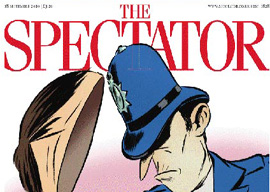
October 24, 2011

The Spectator’s detractors—there are very few—complain that it’s elitist and edited only by old Etonians. Our answer is that there’s nothing wrong with elitism and as far as old Etonian editors are concerned, I’ve served under seven, and only five of them had gone to Eton. The present editor, Fraser Nelson, is a very good-looking young man who was the first to ring me when he was appointed. “I’m sorry to tell you that I haven’t received a single call asking me to fire you” was his opening. (Most past editors had received such requests, especially from the Israeli Embassy.)
Great names of literature and journalism have always graced the Speccie’s masthead. John Betjeman, poet laureate, wrote on architectural topics; theater producer Kenneth Tynan was the drama critic; playwright John Osborne was a diarist; novelists Nancy Mitford, Evelyn Waugh, and Graham Greene were contributors; Auberon Waugh was a long-time columnist, to name just a few past greats. Paul Johnson, the greatest living historian, now writes regularly on religion, gardens, fashion, and, of course, history. Former editor Boris Johnson is now the Mayor of London and tipped to be the next prime minister “if he can keep his pants on,” as a recent Speccie article warned. A recent arrival—it was ten years ago, which is recent by Speccie standards—is Jeremy Clarke, who writes the low life to my high life. Under Fraser Nelson’s expert guidance, Jeremy has reached superstardom with his brilliant writing. The last low life, Jeff Bernard, had a play written about him and was portrayed by Peter O’Toole onstage. The play was a runaway success under the euphemism the magazine used when Jeff was too drunk to file copy: Jeffrey Bernard is Unwell. (Bernard died the same day as Princess Diana and was thus deprived of the spectacular obituaries he had announced in his deathbed.)
The Spectator’s genius is a simple one. Its writers continue to believe they are communicating with a smallish and highly educated and sophisticated audience. They write as if they were addressing their aunt Agatha, their eccentric and terrifying relation who got a 1st at Oxford age 16 and who now lives in a crumbling stately home owned by her half-witted brother. Long may the Speccie reign.